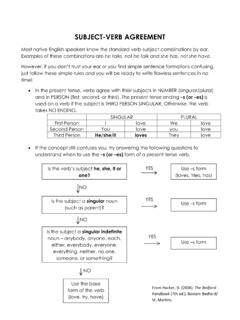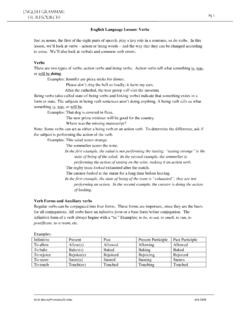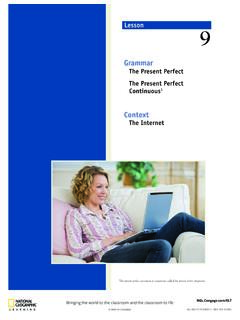Singular And Plural Verbs
Found 6 free book(s)SUBJECT-VERB AGREEMENT
www.menlo.eduIn the present tense, verbs agree with their subjects in NUMBER (singular/plural) and in PERSON (first, second, or third). The present tense ending –s (or –es) is used on a verb if the subject is THIRD PERSON SINGULAR. Otherwise, the verb takes NO ENDING. SINGULAR PLURAL First Person I love We love Second Person You love you love
LANGUAGE FUNCTIONS and FORMS
woucentral.weebly.comsingular and plural, personal pronouns, present tense, simple sentences Connected text including irregular nouns, personal, possessive pronouns and adjectives with some irregular past tense verbs Concrete and abstract topics using irregular nouns, singular and plural, personal and possessive pronouns and adjectives Clear, well-structured,
English Grammar: Pg 1
walton.uark.eduVerbs change according to their person and number. Example (to throw): Singular Plural 1st person I throw We throw 2nd person You throw You (all) throw 3rd 1person 2 He/she/it throws They throw 1 When conjugating according to person and number, notice that there is a slight deviation for 3rd person present
BUSINESS COMMUNICATION - ICSI
www.icsi.eduThe indefinite article is used before singular countable nouns, e.g.,A car, an apple, a table. The definite article is used before singular countable nouns, plural countable nouns and uncountable nouns,e.g., The pen, the pens, the milk, the idea. The article ‘an’ is used when the noun to which it is attached begins with a vowel sound (a, e ...
4542 ch01 pp001-040 - NGL
ngl.cengage.complural nouns. You have used your computer a lot. We have written a job résumé. They have bought a new computer. Computers have changed the world. Subject has Past Participle Complement Explanation My sister has gotten her degree. Use has with he, she, it, and singular nouns. She has found a job as a programmer. My father has helped me.
Infinitivsätze - mein-deutschbuch.de
mein-deutschbuch.deeines Verbs, also die nicht konjugierte Form eines Verbs, nennt man "Infinitiv". Verben im Wörterbuch stehen immer im Infinitiv. Unter bestimmten Voraussetzungen kann auch ein " Infinitiv " im Satz stehen. Dies ist oft der Fall, wenn 2 Verben im gleichen Satz stehen sollen. Als Verbform kann der Infinitiv mit oder ohne "zu" im Satz stehen.





